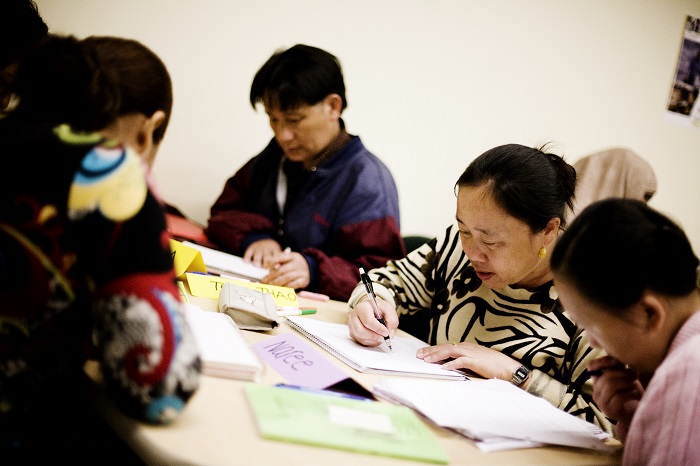- MN ABE Connect
- Archive
- Language and Literacy ESL Roundup!
 February 14, 2022
February 14, 2022
Language and Literacy ESL Roundup!
Andrea Echelberger, Literacy TeacherIf you’re an ESL teacher who missed this year’s Language & Literacy conference, or if you just weren’t able to make it to all of the sessions, have no fear! All of the conference sessions were recorded, so even though the conference is over, you can still continue to learn with and from your ESL colleagues. Check out the videos and resources from these ESL-focused sessions for ideas to invigorate your teaching this winter.
Visit the full Language & Literacy 2022 playlist to watch all the recorded sessions from the conference!
Teachers Helping Teachers Help Learners to Write
Presented by Miriam Bosveld, Academic Adult Program Robbinsdale and Susan Telander, Metro South ABE
Writing is difficult for learners. Reading and Listening are receptive, the learner can stay quiet if they prefer. Writing and Speaking are productive. Speaking can be awkward for learners, but the spoken word disappears into the air. Writing, on the other hand, is visible. Many learners would prefer not to see their mistakes in print! Also, many learners struggle with how to get started and how to organize their thoughts. The presenters don’t have all the answers but do have some good ideas based on 15 years of teaching Beginner and Intermediate level ESL. This workshop provides a thoughtful look at writing in a Beginning to Intermediate ESL classroom and some concrete ideas as to how we can help learners. They even tackle the big question…should learners use their phones to write?
Reading Routines for English Language Learners
Presented by Mara Martinson, Minneapolis Adult Education
Explore reading routines meant to support ELL students, including a presentation of CCRS based routines that allow students to develop skills in phonemic awareness, fluency, and comprehension. The goal of this presentation is to help teachers develop routines which build reading skills and empower students–especially with low levels of English–to communicate their reading strengths and goals.
CCRS Speaking and Listening Activities for Literacy Level Learners
Presented by Andrea Echelberger, Robbinsdale Adult Academic Program and Nicki Olalde, Lyndale Education Program
With so much to teach in a literacy level classroom, speaking and listening can easily take a backseat to reading and writing. But speaking and listening form the foundation for building strong literacy skill, and are essential for learners engaging in and feeling safe in school and broader activities. This session shares several speaking and listening activities specifically designed for literacy level learners, and draws clear connections between the activities and the CCR standards for speaking and listening. The presenters share scaffolding strategies to support learners, and recommendations for how the activities can become regular parts of classroom routines.
Translanguaging as an Antiracist Practice
Presented by Cydnee Sanders and Betsy Parrish, Hamline University
Many of us have heard the terms antiracist and translanguaging, but how do these two frameworks intersect? This session goes beyond defining antiracism and explores how the research around “Translanguaging” by Ofelia García (2017) provides us with tools to change the way we approach teaching. Translanguaging is when learners make use of their full linguistic toolkit to make meaning and communicate ideas effectively, and where educators place value equally on all of learners’ languages. Explore how to apply translanguaging practices in order to create more equitable classrooms for all adult learners.
The Mirroring Project: A Pronunciation Approach for In-class, Online, Group or Individual Pronunciation Instruction
Presented by Colleen Meyers, Literacy Minnesota and Suzanne McCurdy, UMN
L2 learners often identify pronunciation as one of the largest obstacles to being understood, especially in this environment of mask-wearing and remote technology. What can we do to support our students in achieving a more user-friendly pronunciation?
This interactive workshop introduces an approach known as mirroring, in which L2 learners identify a model and practice “being” the person whom they have chosen. The presenters introduce the approach and guide teachers step-by-step through the implementation of the approach with their learners, whether the setting is online, in-person, with groups, or tutoring individuals.

Newsletter Signup
Get MN ABE Connect—the official source for ABE events, activities, and resources!
Sign UpArticle Categories
- ABE Foundations/Staff Onboarding
- ACES/Transitions
- Adult Career Pathways
- Assessment
- CCR Standards
- Citizenship
- COVID-19
- Cultural Competency
- Digital Literacy/Northstar
- Disabilities
- Distance Learning/Education
- ELA
- Equity/Inclusion
- ESL
- HSE/Adult Diploma
- Listening
- Math/Numeracy
- Mental Health
- Minnesota ABE
- One-Room Schoolhouse/Multilevel
- Professional Development
- Program Management
- Reading
- Remote Instruction
- Science
- Social Studies
- Speaking/Conversation
- Support Services
- Teaching Strategies
- Technology
- Uncategorized
- Volunteers/Tutors
- Writing